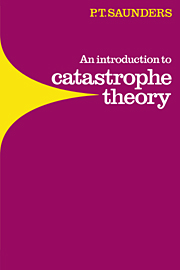Book contents
- Frontmatter
- Contents
- Preface
- 1 Introduction
- 2 Background
- 3 The seven elementary catastrophes
- 4 The geometry of the seven elementary catastrophes
- 5 Applications in physics
- 6 Applications in the social sciences
- 7 Applications in biology
- 8 Morphogenesis
- 9 Conclusions
- Exercises
- Appendix. Elementary catastrophes of codimension ≦ 5
- References
- Author index
- Subject index
- Frontmatter
- Contents
- Preface
- 1 Introduction
- 2 Background
- 3 The seven elementary catastrophes
- 4 The geometry of the seven elementary catastrophes
- 5 Applications in physics
- 6 Applications in the social sciences
- 7 Applications in biology
- 8 Morphogenesis
- 9 Conclusions
- Exercises
- Appendix. Elementary catastrophes of codimension ≦ 5
- References
- Author index
- Subject index
Summary
Like any other major advance, catastrophe theory depends on a number of concepts with which the reader new to the field is unlikely to be familiar. The aim of this chapter is to provide an introduction to these which is as simple as possible. A more sophisticated, but still relatively accessible, account is given by Poston & Stewart (1978a). Mathematicians might prefer Lu (1976) or, for full proofs, Brocker & Lander (1975) or Trotman & Zeeman (1976).
Structural stability
Implicit in science is the belief that there is some sort of order in the universe and that, in particular, experiments are generally repeatable. What is often not recognized is that what we demand of nature in this regard is not mere repeatability, but something rather more. It is never possible to reproduce exactly the conditions under which an experiment was performed. The quantity of one of the reagents may have been altered by 0.001%, the temperature may have increased by 0.0002 K, and the distance from the laboratory to the moon will probably be different as well. So what we really expect is not that if we repeat the experiment under precisely the same conditions we will obtain precisely the same results, but rather that if we repeat the experiment under approximately the same conditions we will obtain approximately the same results. This property is known as structural stability.
Information
- Type
- Chapter
- Information
- An Introduction to Catastrophe Theory , pp. 17 - 29Publisher: Cambridge University PressPrint publication year: 1980
Accessibility standard: Unknown
Why this information is here
This section outlines the accessibility features of this content - including support for screen readers, full keyboard navigation and high-contrast display options. This may not be relevant for you.Accessibility Information
- 1
- Cited by
